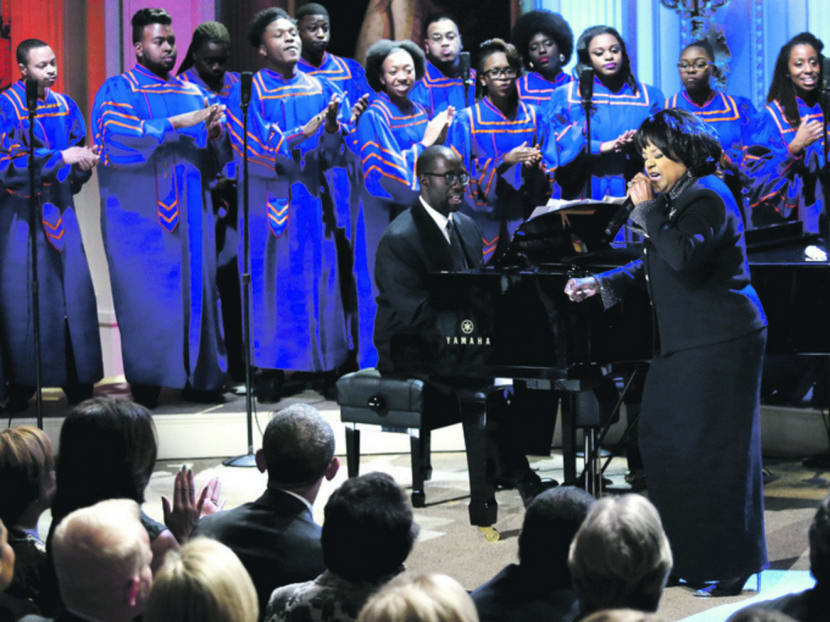Choir singers live longer — that’s the gospel truth
LONDON — Michelle Obama recently praised the power of gospel music, saying, “for so many, when times have darkened, when there’s struggle, gospel music is that ray of hope and it gives you that strength”.

Pastor Shirley Caesar performs with the Morgan State University choir as part of a tribute to gospel music at the White House.
Photo: Reuters
LONDON — Michelle Obama recently praised the power of gospel music, saying, “for so many, when times have darkened, when there’s struggle, gospel music is that ray of hope and it gives you that strength”.
But evidence suggests that those who create gospel music are also likelier to have happier lives.
Research undertaken by Dianna Theadora Kenny, a Professor of Psychology and Music at the University of Sydney, showed gospel singers are 7.5 times less likely to take their own lives than the rest of the population, and 21 times less likely than punk musicians.
Kenny did the first population study of 12,665 performing pop musicians who died between 1950 and June 2014, the majority of whom (90.6 per cent) were men.
After finding out information on age, circumstances and manner of death from more than 200 sources, Kenny compared the population averages by sex and death with those of the population in the United States in the same decade of death.
She found that gospel singers had a far better quality of life than the average American person, with lower rates of accidental, suicidal, homicidal and cancer-related deaths and only marginally higher rates of heart-related death.
Kenny also discovered that hip-hop and rap musicians are nearly nine times likelier to die from homicide than the average person, but their risks of cancer and heart disease are around a third lower.
Jazz and folk musicians are at considerably higher risk of cancer than the average population, but jazz performers suffer fewer accidents and murders than the average American.
Metal and punk prove the most emotionally damaging genres, with considerably higher rates of suicide: 19.3 per cent of metal musicians and 11 per cent of punk musicians took their own lives, and the national average is 6.8 per cent.
These genres also suffered highest accidental deaths: Metal at 36.2 per cent, and punk at 30 per cent. Rock musicians were also higher than the 19.5 per cent national average at 24.2 per cent.
Kenny’s research debunked the 27 Club myth, instead showing that the most deadly age for professional musicians is 56.
She found that 2.2 per cent of those (239 people) died at 56, far more than the 1.3 per cent (144) who died at 27. The likes of Kurt Cobain, Jim Morrison and Jimi Hendrix weren’t even in the second most popular bracket — nine more musicians died aged 28 than at 27.
Among the musicians who died at 56 were country singers Chris LeDoux and Tammy Wynette, singer and activist Mimi Farina, guitarist Johnny Ramone, The Impressions singer Vandy “Smokey” Hampton and Blues guitarist Charles “Baby” Tate.
Kenny attributes the strength of the 27 Club myth not to the tragically young age at which they died, nor the number of musicians who did, but rather the personal qualities of the six or seven most notable members.
Kenny writes that these members (Cobain, Amy Winehouse, Morrison, Janis Joplin, Hendrix and Rolling Stones’ Brian Jones) shared “exceptional talent, the contribution of groundbreaking innovations in their musical genre, intense psychological pain, a squalid death at their peak and immortalisation”.
The fact that Joplin, Hendrix and Morrison all died at 27 within months of each other strengthened the myth in the early 1970s.
The romanticising of the deaths of these young musicians has been decried by people close to them. Frances Bean Cobain, the 22-year-old daughter of Kurt and his wife Courtney Love, recently criticised musician Lana Del Rey for doing so and is outspoken on the matter. THE DAILY TELEGRAPH





